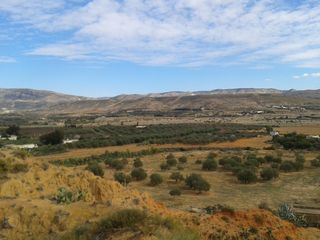
In semi-arid zones, agriculture is based on limited and fragile "water and soil" resources that are often over-exploited. Environmental assessment in these areas is difficult due to lack of data. Our study area is located at the upstream watershed Merguellil, located in central Tunisia, a Mediterranean country, characterized by a semi-arid climate with high variability of rainfall and high evaporation rates (Lacombe, 2008) and it is also considered an important recharge area for aquifers. In the Mediterranean region, land degradation and water resources are a challenge for people and the environment. Mediterranean agriculture is characterized by small farms - many farms are less than 10 hectares - and they are economically less efficient. The upstream Merguellil brings together the major environmental issues such as variable and limited resources, over-exploitation of water resources, poor control of access to groundwater and accelerated soil degradation. These problems are also encountered throughout the Mediterranean basin, the Merguellil basin can then be considered as an exemplary case (Leduc et al., 2007). This area also has low data availability. Since 1990, this basin has been the subject of several water and soil conservation works to protect soil against water erosion and protect the downstream part of the Merguellil watershed (the Kairouan plain). The rapid expansion of conservation measures and the development of intensive irrigated agriculture have raised the issue of their environmental impacts and particularly on soil resource.
In the context of managing a common "water and soil" resources and taking into account the diversity of agricultural practices within an agricultural territory, it is important to assess the impacts at the scale of a territory. Our main objective is to assess the environmental impacts of water and soil conservation works (WSCW) and the most relevant farming systems by life cycle assessment (LCA) at territory scale.
LCA is an internationally standardized method, widely used to assess the potential environmental impacts of a system by accounting and evaluating the resource consumption and emissions in the environment in eco-design objectives or to optimize existing processes. It presents characteristics of global approach (all environmental impacts are considered) and life cycle ("from cradle to grave"). Soil is an essential component of the ecosystem, not only for agricultural production but also for ecosystem sustainability (regulation of flows, habitat, ...). It is therefore important to evaluate the impacts of agricultural activities on soil quality. To apply LCA to our system, we must take into account the impacts of the different "Land use" types in our territory. However, water and soil conservation works (WSCW) are not included in current LCA methods. The main objective of this thesis is to provide knowledge about the environmental impacts of agricultural practices and WSCW for decision-makers at the scale of a territory.
Achieving these goals poses three research questions:
- How to obtain inventory data to assess the impacts of agricultural activities in agricultural territory? How to achieve a LCA of a territory with low data availability?
- How to take into account in LCA the impacts of WSCW on the "soil" resource?
- How to integrate agricultural activities (including practices) and WSCW into a territorial approach to provide decision-making elements to the different stakeholders?
Southern countries present a major constraint for an environmental assessment, it is the availability and the robustness of data of the agricultural practices and farming systems. Thus, our strategy is to couple the approach of life cycle assessment (LCA) with a participatory approach. The coupling between these two approaches consists to collect data, integrating the knowledge and the perception of the local actors and to create knowledge on the environmental impacts for all stakeholders in our territory (the decision-makers, the farmers, etc.) in a context of decision support.
Keywords: Life Cycle Assessment, Resources "Water & Soil", Environmental Evaluation
Photos: Haffouz Area, Merguellil Watershed, Tunisia ©Meriem Jouini






